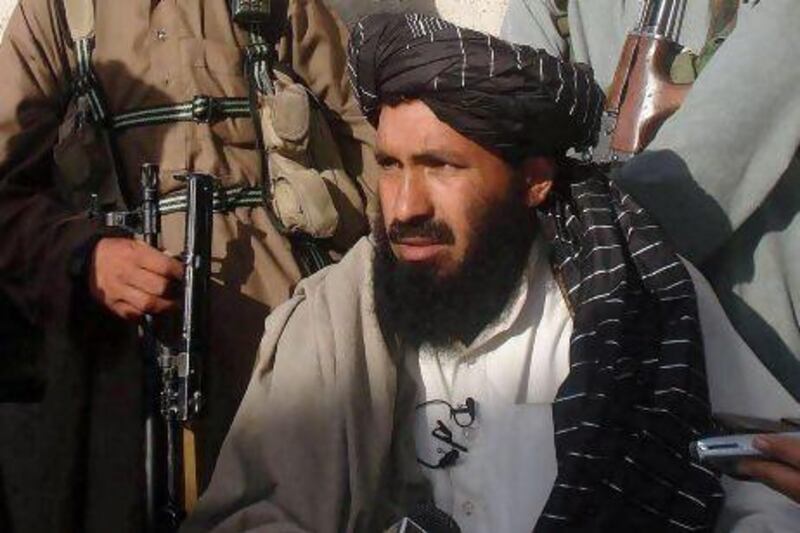PESHAWAR, Pakistan // A senior Taliban commander who fought American forces in Afghanistan but had a truce with the Pakistani military was killed in US drone strikes on north-west Pakistan, intelligence officials said yesterday.
Mullah Nazir, was among nine people killed by a missile strike on a house in the village of Angoor Adda in the South Waziristan tribal region, near the border with Afghanistan, late on Wednesday, Pakistani security officials said.
At least four people were killed in a separate drone strike yesterday morning near Mir Ali, the main town of the North Waziristan tribal region.
The use of drones by the United States against militants in Pakistan has increased substantially under president Barack Obama.
The programme has killed a number of top militant commanders during the past year.
But the drone strikes are extremely contentious in Pakistan, where they are seen by many as an infringement on the country's sovereignty. And while the US maintains that it targets only militants, many Pakistanis complain that innocent civilians have also been killed.
Nazir's killing could cause even more friction in the already tense relationship between Washington and Islamabad.
Pakistan was believed to have struck a non-aggression pact with Nazir ahead of its 2009 military operation against militants in South Waziristan.
Fighters under Nazir's command had focused their attacks on American forces in neighbouring Afghanistan, earning him the enmity of the US.
But many in Pakistan's military viewed Nazir and militant chiefs such as him as "good Taliban", on the grounds that they focus attacks only on foreign forces in Afghanistan, keeping the domestic peace by not attacking Pakistani targets.
However, Nazir outraged many Pakistanis in June when he announced he would not allow any polio vaccinations in territory under his control until the US halted drone attacks in the region.
Pakistan is one of three countries where polio is still endemic. Nine workers involved in anti-polio vaccination campaigns were killed last month by militant gunmen, and the murder this week of five female teachers and two aid workers may also have been linked to their work on the polio campaigns.
Residents in Angoor Adda and Wana, the biggest town in South Waziristan, said mosque loudspeakers had announced Nazir's death.
Nazir, who was thought to be about 40 years old, owned property in both Pakistan and Afghanistan. He used to be a member of Hizb-e-Islami, a militant Islamist group run by the former Afghan prime minister Gulbuddin Hekmatyar.
Nazir had survived several assassination attempts, including at least two previous US drone strikes.
No group claimed responsibility, but suspicion immediately fell on rival militants, including the head of the Tehrik-e-Taliban, Hakimullah Mehsud, who had been jockeying with Nazir for power in South Waziristan.
Nazir's group quickly appointed his close aide, Bawal Khan, as his replacement, according to one of Nazir's commanders.
The former chief of intelligence in north-west Pakistan, retired brigadier Asad Munir, said Nazir's killing would complicate the fight against militants in the tribal region, and could prompt Nazir's group to carry out retaliatory attacks against the Pakistani army in South Waziristan.
It will also raise questions among military commanders in the country who would like the US to use its firepower against the Pakistani Taliban, which attacks domestic targets, and not against militants such as Nazir who aren't seen as posing as much of a threat to the state, Mr Munir said.
He added that the risk now for Pakistan was that the remnants of Nazir's group could join ranks with the Pakistani Taliban in its war with the government and army.
Drone strikes have been on the rise during Mr Obama's presidency. According to the Long War Journal, which tracks drone strikes, there were 35 in Pakistan during 2008, the last year President George W Bush was in office.
That figure shot up to a peak of 117 in 2010 and then dropped to 46 last year. The strike that killed Nazir was the first this year.





